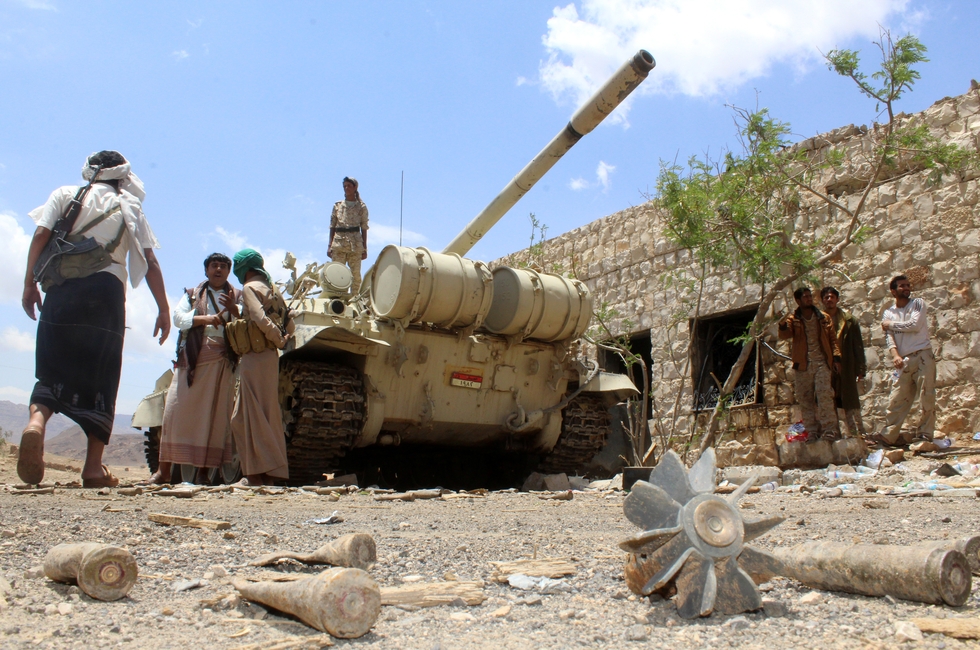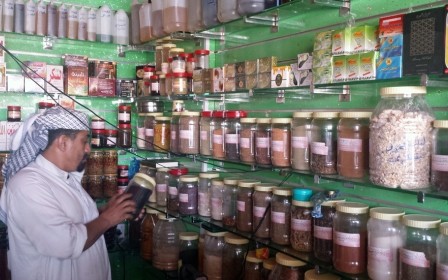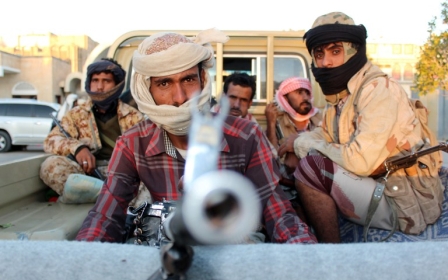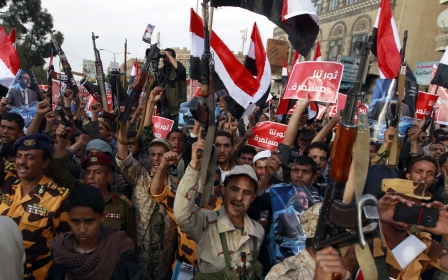Widespread late clashes cast shadow over Yemen ceasefire

Fierce fighting was reported in several areas of Yemen on Sunday in the hours leading up to a UN-brokered ceasefire aimed at laying the groundwork for forthcoming peace talks.
Local sources told Middle East Eye the ongoing violence had cast doubts over the ceasefire. "Fierce clashes are still ongoing on more than one front in Taiz and al-Jawf provinces," local journalist Nasser al-Sakkaf told MEE on Sunday.
Nevertheless, the truce began at midnight (2100 GMT), the loyalist military's chief of staff of forces loyal to President Abd Rabbuh Mansour Hadi said. "The ceasefire has taken effect and we are going to respect it... unless the Houthi rebels violate it," General Mohamed Ali al-Makdashi told reporters.
The Iran-backed Houthis, along with allied troops loyal to ex-President Ali Abdullah Saleh, sent the UN a letter committing to "cease land, sea and air military operations" throughout Yemen, according to a communique carried by the rebel-run Saba news agency.
It is hoped that the ceasefire will serve as the cornerstone of a long-lasting peace deal to be negotiated between Yemeni warring parties on 18 April in Kuwait.
But army commanders and tribal leaders loyal to the government of Hadi told Gulf News that rebel fighters had stepped up their military operations in Marib, Jawf, Taiz, Shabwa and Lahj, apparently to regain control of new areas before the halt of fighting.
Ali al-Ghoules, a spokesperson for the governor of Marib, said the continuing amassing of forces and military equipment inside Houthi-controlled areas in the province did not indicate that the rebels would commit to the ceasefire.
Yemen has been gripped by instability since the Houthis overran Sanaa, the capital, in September 2014 and advanced to other regions, prompting a Saudi-led military campaign in support of President Hadi in March last year.
Fighting also raged on Sunday in regions surrounding Sanaa, while the Houthi-held capital itself, which has been regularly bombed by warplanes of the Saudi-led coalition, was quiet, the AFP news agency reported.
The Houthis, based in the north of the country, and their allies exchanged mortar and artillery fire with pro-Hadi forces in the Sarwah region of Marib province, east of Sanaa, an AFP correspondent said.
Houthis on Saturday night reportedly fired a ballistic missile from a remote village in the province of Sanaa, but residents said it failed to reach its target and exploded too soon after it was launched.
Coalition warplanes carried out fresh air strikes to stop the Houthis seeking to take back a military base that pro-government forces had recaptured in late 2015, military sources said.
Clashes also went on further north in Nihm, about 40km from Sanaa, witnesses said.
Civilian relief
The planned truce was agreed by the warring sides after months of shuttle diplomacy by UN envoy Ismail Ould Cheikh Ahmed.
Despite the violence, the UN's relief official for Yemen said he was hopeful that the ceasefire would lead to relief for civilians in Yemen.
“If respected, the agreement will provide men, women and children in Yemen a much-needed respite from the increased violence they have been facing on a daily basis for over a year now,” said Humanitarian Coordinator Jamie McGoldrick.
“Regardless of the outcome of the peace talks, the United Nations and our humanitarian partners will continue responding to the humanitarian needs of people, wherever they may be found and despite the great obstacles faced,” he said.
The Houthis and Hadi's government said last week that they have submitted their remarks to the UN mediator on the terms of the ceasefire, which will test their willingness to negotiate a peace deal at the Kuwait talks.
"We will go to the consultations [in Kuwait] to achieve peace," Hadi reiterated on Saturday, insisting, however, that the Houthis must commit to UN Security Council Resolution 2216, which calls for their withdrawal from seized territories and disarmament.
Previous UN-sponsored negotiations between the Houthis and the government failed to make any headway, and a ceasefire in December was repeatedly violated and eventually abandoned by the Saudi-led Arab coalition on 2 January.
A source in the Houthi political office on Friday told Middle East Eye that the Houthis welcomed the peace talks but would never allow Hadi and his backers to rule them.
"If Saudi Arabia needs to end the war in Yemen, the traitor Hadi should not be part of the solution," the source said.
"Yemenis will not accept him again after he brought the invasion to destroy our country.
"The Houthis forgave Ali [Abdullah] Saleh who fought them in Saada for six years," he said in reference to the former president who is now aligned with the Houthis and the northern province that is a Houthi stronghold.
"They can forgive anyone who did not participate in the invasion against Yemenis - but they cannot forgive traitors."
Yemenis doubtful
Yemenis appear to have learned not to get their hopes up after previous ceasefires failed.
"I do not expect the truce to succeed," said Zayed al-Qaisi, a resident of Marib. "The Houthis have not honoured their commitments during the wars against the state since 2004."
Others in Sanaa voiced doubts that Saudi Arabia would commit to the truce.
"Saudi Arabia is just procrastinating and being deceptive," said 50-year-old Sanaa resident Ali Mohsen.
Umm Mohammed, waiting for her children outside a school in central Sanaa, agreed that the truce was "a deception. We tried it unsuccessfully before. I want a real end to the war".
More than 6,300 people have been killed in the year-long fighting, with about half of the victims being civilians, while 30,000 have been wounded, according to the UN.
New MEE newsletter: Jerusalem Dispatch
Sign up to get the latest insights and analysis on Israel-Palestine, alongside Turkey Unpacked and other MEE newsletters
Middle East Eye delivers independent and unrivalled coverage and analysis of the Middle East, North Africa and beyond. To learn more about republishing this content and the associated fees, please fill out this form. More about MEE can be found here.




